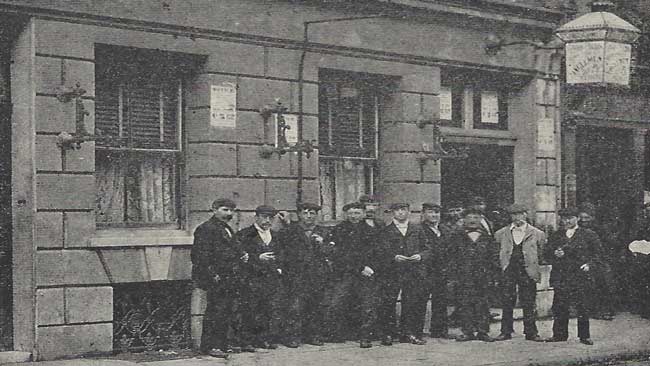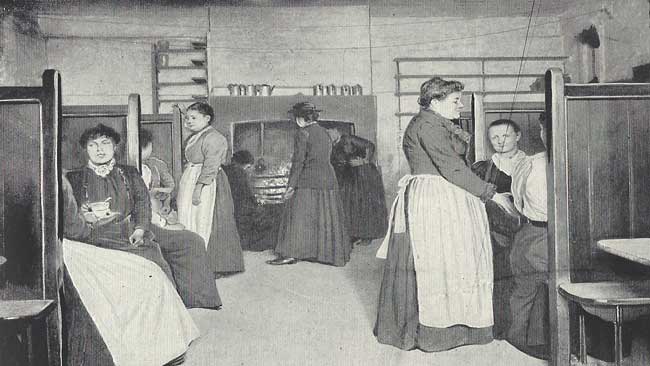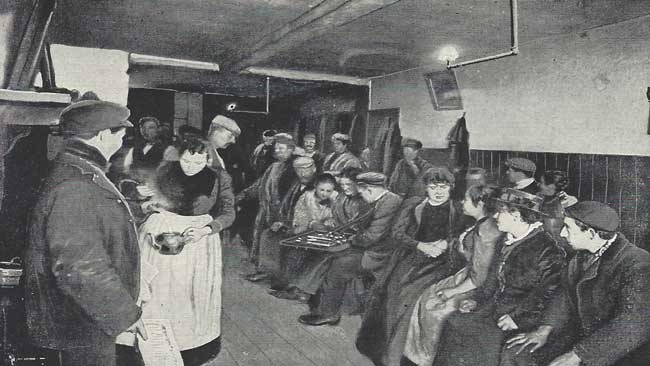One of the recurring themes in the Jack the Ripper case is the fact that almost all the victims inhabited the common lodging houses of Spitalfields.
But, what was life like inside them?
An article in The Pall Mall Gazette on the 27th September 1883, provided readers with a glimpse at the inner workings of Victorian London’s common lodging houses.
The article is intriguing in that it provides an insight into life inside the common lodging houses and gives us an idea of the type of person that resorted to them.
It is also interesting because it makes a point that doesn’t become readily apparent when reading the articles on the Whitechapel Murders, i.e. that the worst of the lodging houses weren’t to be found in Spitalfields but were, in fact, way to the west – in Notting Hill.
Here is the article in full:-
THE COMMON LODGING HOUSE

“When a man has sunk from the position of a householder he has two courses open to him.
If his employment be still sufficiently remunerative, he may inhabit one of the dens known as furnished lodgings.
These are rooms let singly, and supplied with a couple of chairs, a flap doing duty for a table, and a blackened sack stuffed with straw on an old and shaky four-poster bedstead. For these advantages he is charged the nightly sum of eight pence, which a long experience has taught the intelligent landlord to exact beforehand.
FOURPENCE FOR A KIP
Eightpence is a large sum, and cannot always be afforded, so the next alternative is the common lodging-house, or “kip,” which, for the moderate sum of fourpence, supplies the applicant with a bed, use of lavatories, kitchen and kitchen fire, for the space of twenty-four hours at the most.
The kip is under the unwinking eye of the law, which is supposed to ensure cleanliness – i.e., clean sheets once a fortnight; decency, i.e., the separation of the dormitories of the two sexes, and sanitation, which means something almost as indefinite as common sense.
OVERCROWDING WAS UNIVERSAL
The older inhabitants of the “kip” relate most harrowing details about these places before this super-vision and registration took place, which it is a pity even to evoke from oblivion.
Suffice it to say that any one might start a lodging-house, and overcrowding was universal – which of course is sometimes the case now, only sub rosa, and in not more than every other house in poor districts.
VARIED INHABITANTS
The better “kip is frequented by men only, and many an old soldier or pensioner lives permanently in them.
But, the majority of the houses are open to persons of all ages and sexes and all degrees of social status.
THE COMMON KITCHEN
The prominent feature of all “kips” is the kitchen.

This is at once dining-room, drawing-room, smoking and card compartment, as well as kitchen.
At one end is the swing door, which leads to the long sawdust floored room, surrounded with benches, or perhaps divided into compartments like a restaurant.
A huge fire, be the weather what it may outside, serves to cook the viands of the inhabitants and to supply the heat which an insufficiency of clothing renders grateful in the colder weather.
A number of tin vessels, supplied by the house, serve for teapots or missiles as the case may be, both uses being frequent.
DEATH UNTO DEATH
The first impression of a ” kip” is that of a savour of death unto death, with variations and permutations.
The men, following afar off Sir Walter Raleigh, perpetrate a consumption of the rankest shag [tobacco].
The fair sex contribute a rasping flavour of so-called tea.
Both eat cheese of decided strength, or herrings of questionable age.
FACES OF UTTER HOPELESSNESS
Most of the faces are such as to strike one with utter hopelessness.

The brutal gin-swollen countenance of the elder women, the hard, dogged faces of the men, and the children furrowed and care worn, the babies who never kick and crow, but are suckled on alcohol and curses, are pictures which are full of grim horror.
Here sits the lad who has left his home at the age of thirteen and set up for himself; next to him is a reprobate parson, who in his sober moments writes discourses for some of his more fortunate but less gifted brethren to inflict upon their congregations.
THE MASS OF HUMAN WRECKAGE
Many ranks and callings contribute their quota to the mass of human wreckage, the sole qualification being the payment of the night’s fourpence.
None is rejected or ejected, unless violently or obtrusively ” boozed.”
There are whole streets of these places, some making up nightly a hundred and fifty beds.
That the worst are not to be found in the East end is the general report.
It is said that Notting-hill has this unenviable supremacy, but this may be disputed very plausibly.
THE DORMITORIES
Upstairs there are dormitories with rows of camp beds bought from the barrack sales, every article of which is marked in large letters “stolen from——–.
The double beds have little wooden partitions between them, with doors and latches upon the same.
The dormitories, as a rule, have no washing conveniences, still less any chests or cupboards.
Those of the inhabitants who possess a change of raiment or any other portable property keep the same at “my uncle’s,” [a euphamism for the pawn shop] from which Sunday suits are weekly redeemed in order to keep holy the Sabbath day, and again resigned to the pledger on the Monday by the owner, who is well acquainted with the ways of his fellow-lodgers.
CRIME AND PAUPERISM
It is a most vital question whether or not the percentage of these places to the population has increased.
If it has, as is most possible, it means that a large idle population, either at or over the borders of crime and pauperism, is growing all around us.
Statistics are very hard to get that are at all conclusive, but the opinion of many of the poor is that “kips” are certainly growing too numerous.
AN ALARMING SPECTACLE
The race bred up in them is an alarming spectacle.
The flux of population defies the School Board, and the characters of the senior inhabitants provide an effective education in devilishness to their juniors, even better than that of her Majesty’s prisons.
The children might, indeed, be taken away and sent to industrial schools, as being found in notorious bad company, but this is seldom done.
These places may not be the exact counterpart of the insulae of the old Roman Empire, but they seem, even to the man not given to croaking, to be serious scandals in the nation’s paths for the future.
